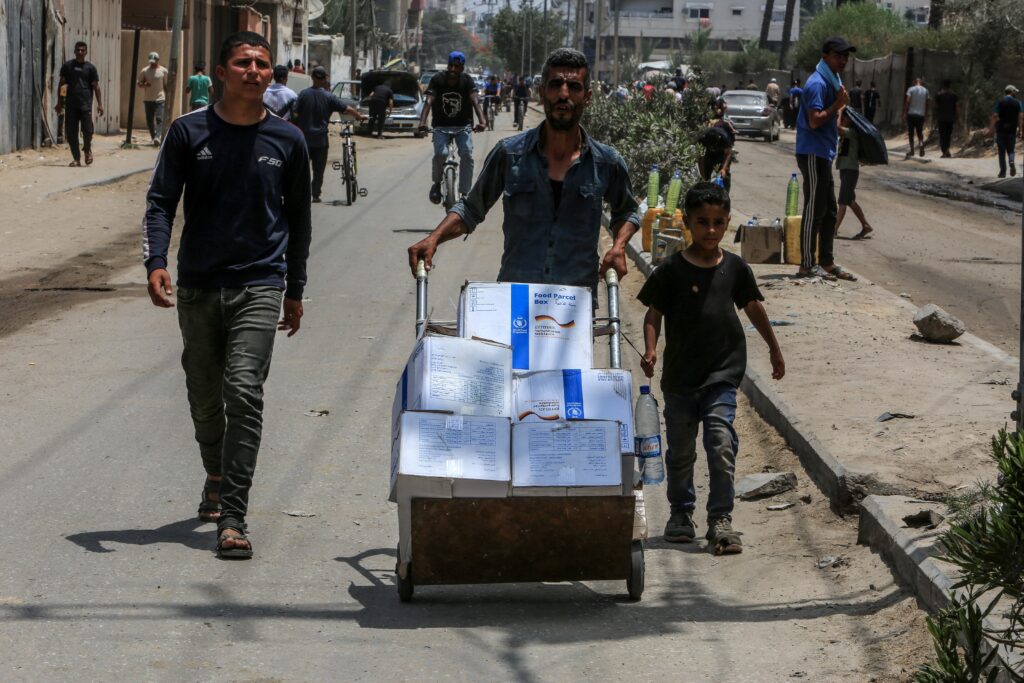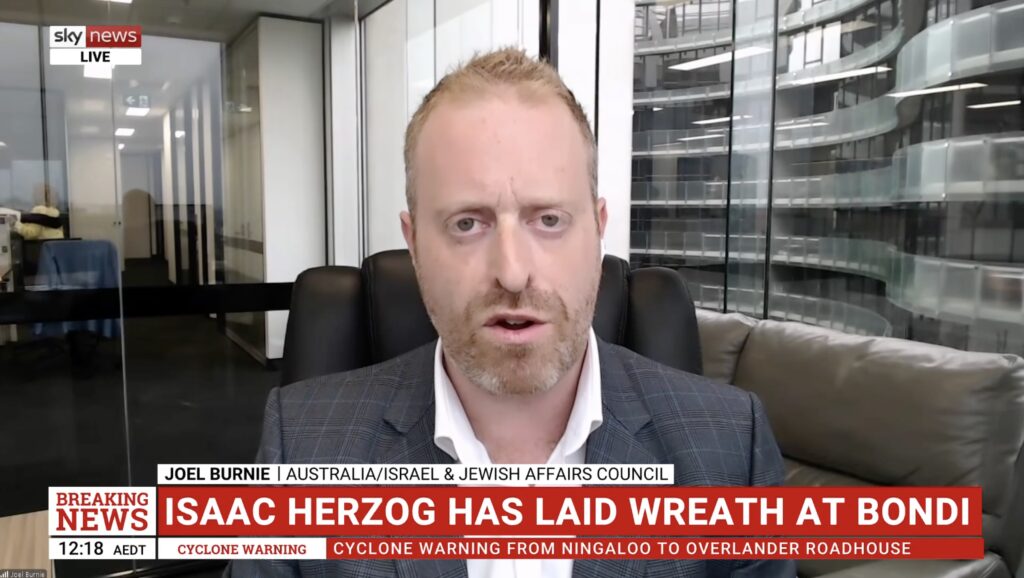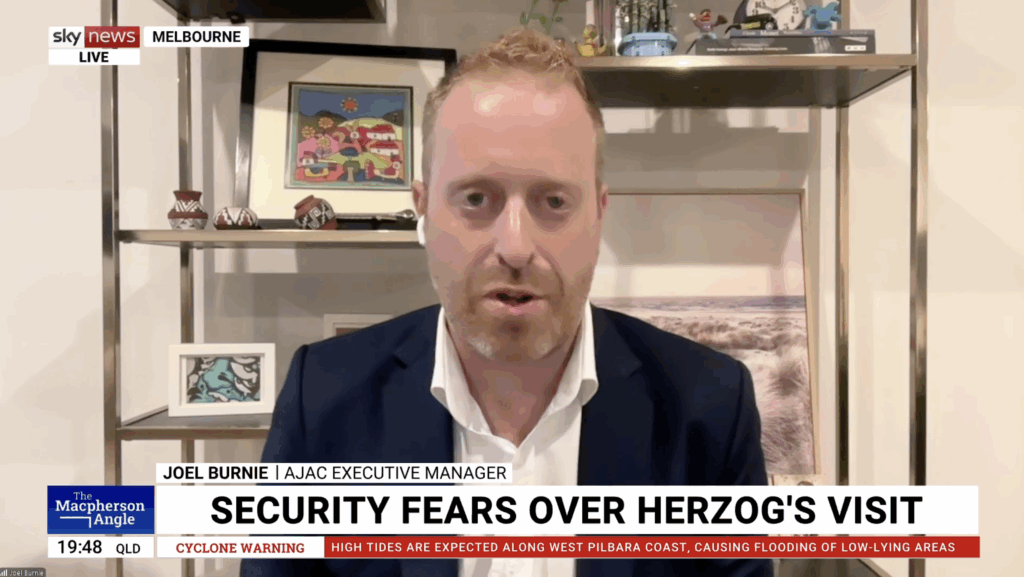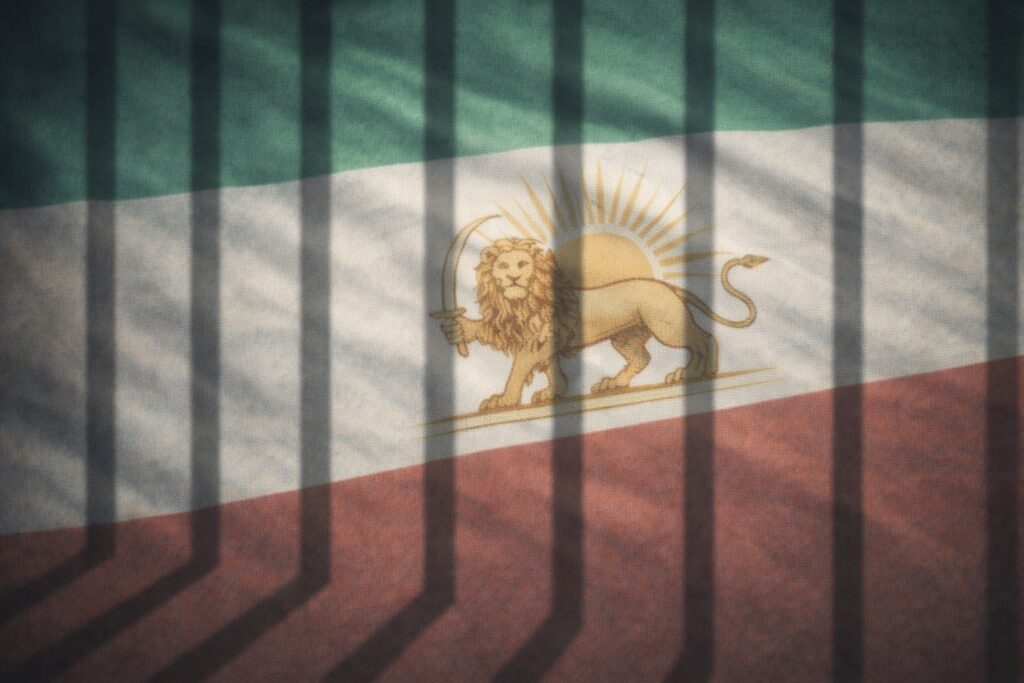UPDATES
Assassination Attempt on Iraqi PM Mustafa al-Kadhimi
November 12, 2021 | AIJAC staff
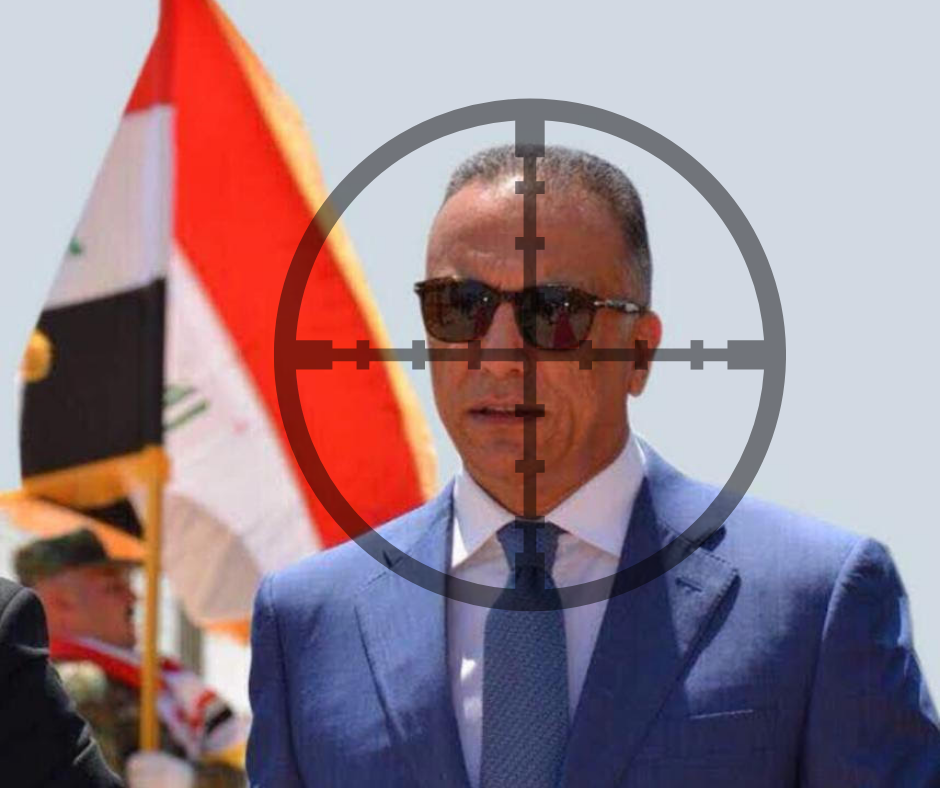
Update from AIJAC
11/21 #02
This Update looks at various aspects of the background and policy implications for the future of Iraq of the assassination attempt on Iraqi PM Mustafa al-Kadhimi at his home last Sunday, using three drones, almost certainly by pro-Iranian militia in Iraq. While he was unharmed, seven of his security guards were injured.
We lead with top Israeli academic and author Jonathan Spyer, who focuses on the relationship between this attack and the recent elections that took place in Iraq on Oct. 10. He notes that the pro-Iranian militias have been strongly protesting the election results, in which they fared poorly, and that their behaviour has powerful parallels with methods that Hezbollah employed in Lebanon to use its armed might to effectively come to dominate the politics of that country. Spyer also notes that this attack falls into a pattern of increasing Iranian assertiveness across the region. To read his astute analysis, CLICK HERE.
Next up is Washington Institute for Near East Policy strategic analyst Michael Knights, examining why Kadhimi is viewed as a threat by the miltias. Knights notes that this is hardly the first time these militias have targeted Kadhimi – who is engaged in slow, step–by-step efforts to gradually reduce the influence of the militias. He suggests that their targeting of Kadhimi is evidence that he must be doing something right and deserves strong support from the international community. For the rest of Knights’ argument, CLICK HERE. A different view of Kadhimi’s efforts comes from Michael Rubin, formerly a US official in Baghdad, who describes Kadhimi’s tenure as PM as a “disappointment.”
Finally, US-based researcher Hussain Abdul-Hussain looks at the Biden Administration’s response to the attack on Kadhimi. Abdul-Hussain argues that the apparently weak response from Washington – merely offering assistance in investigating the attack – risks signalling to Iran that it has nothing to lose by ordering its militias to engage in more violence. He also makes a case that Iraq is not a lost cause, and stronger international support for the anti-Iran coalition trying to disband the militia could rescue the country from becoming an Iranian puppet like Hezbollah-dominated Lebanon. For his full discussion of the policy implications, CLICK HERE.
Readers may also be interested in…
- An Iraqi militia claims the attack on Kadhimi was actually a US plot, staged in order to justify a crackdown on the militias.
- Some good comment on the violent protests at the London School of Economics which forced Israeli Ambassador to the UK Tzipi Hotovely to be evacuated by security officers – from Brendan O’Neill and Jake Wallis Simons.
- Meanwhile, Marc Goldberg, Head of Investigations at Britain’s Community Security Trust, exposes the involvement of pro-Iranian regime activists in helping lead those violent protests.
- Prof. Gerald Steinberg explains the political and ideological context of the furious reaction to Israel’s banning of six Palestinian NGOs because of their close links to the PFLP terror group.
- Israeli actress and author Noa Tishby discusses her new book “Israel: A Simple Guide to the Most Misunderstood Country on Earth” on Sky News Australia’s “Outsiders”.
- Some examples from the many stories and comments now appearing at AIJAC’s daily “Fresh AIR” blog:
- An AIJAC slideshow illustrating links between the violent protests against the Israeli Ambassador in London and pro-Iranian groups, including some with links in Australia.
- AIJAC’s Jeremy Jones moderated a webinar discussion of the state of antisemitism in 2021 with Prof. Dina Porat, former chief historian of the Yad Vashem World Holocaust Centre in Jerusalem.
- A short video excerpt from AIJAC’s recent webinar with Moroccan Ambassador to Australia His Excellency Ambassador Karim Medrek, in which he explains Morocco’s role in hopefully serving as an example to other states in showing how obstacles to good relations can be overcome.
- A written summary of that full webinar was published on J-wire.
Who Bombed Iraq’s Mustafa al-Kadhimi?
Much depends on how the prime minister responds to the Iran-backed Shiite militia groups that tried to kill him.
By Jonathan Spyer
Wall Street Journal, Nov. 8, 2021

The background to the attack on Mustafa al-Kadhimi was the elections that took place on Oct. 10 – with pro-Iranian groups doing poorly. (Image: Shutterstock, PX Media)
The attempted assassination of Iraqi Prime Minister Mustafa al-Kadhimi at his Baghdad home Sunday represents a grave escalation in that strife-torn country. The political authorities’ response may determine whether Iraq has a chance to emerge from endless crisis or is set on a path of Lebanonization—de facto rule by armed militias in the service of a foreign state.
No group has claimed responsibility for the three drones launched at Mr. Kadhimi’s residence in the Green Zone, the area where government offices are located in Baghdad. But the affiliation of the perpetrators is not in doubt. Only Iran-supported Shiite militias have the means, motivation and ability to mount an armed drone attack of this type.
What led to the current grave escalation? Elections took place in Iraq on Oct. 10. The big winners were the Sairoon list of the Shiite cleric Moqtada al-Sadr. His list won 73 seats in the 329 member Iraqi Council of Representatives. The major losers were the pro-Iran element. The Fatah Alliance, representing the bulk of the pro-Iranian militias, achieved only 17 seats. In the previous parliament, they held 48.
The militias have refused to accept the outcome, dispatching supporters to the streets to demand a recount of the election results. The main organizations engaged in protest are the Asaib ahl al-Haq and Kataib Hezbollah groups, which are linked to Iran’s Islamic Revolutionary Guard Corps. The protests turned violent on Friday as militia supporters attacked the Green Zone. The crowd threw stones at police and sought to force its way into the Green Zone, where the U.S. Embassy and other missions are located. At least one person was killed by security forces.
In an ominous public statement at Saturday’s funeral for the slain militia supporter, Asaib Ahl al Haq militia leader Qais al-Khazali threatened the prime minister. Mr. Khazali noted that he had taken action in response to the January 2020 drone-strike deaths of Quds Force leader Qassem Soleimani and Kataib Hezbollah leader Abu Mahdi al Muhandis. “The blood of the martyrs will judge you,” Mr. Khazali repeatedly declared in reference to Mr. Kadhimi. On Sunday, the militias made good on this threat.
Contrary to reports, October’s election results weren’t evidence of a collapse in support for the militias, which have a considerable constituency among Iraqi Shiites. The problem for the militias was the ineptitude of their campaign. A new electoral law required a careful husbanding of the number of candidates in new multiseat constituencies. Mr. Sadr grasped the essentials and gained accordingly. The militias did not.
Faced with the prospect of political irrelevance, the Shiite militias are now responding by doing what they do best: contesting the matter of political power by the employment of armed strength.

There are clear parallels between the way pro-Iranian militias in Iraq are trying to dominate Iraqi politics using armed strength and how Hezbollah has done the same to dominate the politics of Lebanon (Photo: Shutterstock, Gabriele Pedrini)
In Lebanon in 2008, Hezbollah—the local Iranian proxy—took control of West Beirut and stopped a Western-oriented political reform in its tracks, deciding the question of who really possessed power in the country. No one has since tried to challenge Hezbollah. Investors fled Lebanon as it fell into economic disaster and political paralysis.
Iraq now faces a similar predicament. The militias aren’t isolated gangs. They are burrowed deep in the Iraqi government. The Popular Mobilization Commission, the framework within which the militias operate, is part of the official state security forces. The Federal Police and Interior Ministry are filled with militia personnel doubling as servants of the state. An extensive parallel economy and even a private prison system are maintained by these forces.
It isn’t clear if the Iraqi state possesses the will or ability to disarm these groups, but any chance the country has of emerging from permanent crisis and dysfunction depends on its doing so. History suggests that a democratic system can’t permanently coexist with armed mass political movements. Sooner or later, the latter will prevail or be destroyed.
What’s happening in Iraq is part of a larger pattern of Iranian assertiveness in the region. The attack on the U.S. base in Tanf on Oct. 20, the continuing intimidation of Judge Tarek Bitar in Lebanon, and the killings of Iranian oppositionists in northern Iraq are all part of the same process of muscle flexing. The attempt to murder the elected Iraqi prime minister sharply raises the stakes. Much now depends on the response.
Mr. Spyer is director of the Middle East Center for Reporting and Analysis and a research fellow at the Middle East Forum. He is author of “Days of the Fall: A Reporter’s Journey in the Syria and Iraq Wars.”
The Harrowing of Mustafa Kadhimi
by Michael Knights
Fikra Forum, Nov 9, 2021
Militias’ repeated targeting of Kadhimi, including this week’s attack on his home, emphasizes that Kadhimi has done something right in his past two years as Prime Minister of Iraq.

The fact that he was targeted by the Iranian proxy militias actually suggests that Iraqi PM Mustafa al-Kadhimi is doing something right in his efforts to push back against militia control over Iraq (Photo: Wikimedia Commons | Licence details)
In Old English, the word “harrowing” suggests a test of fortitude, of suffering through a trial, of being tempted and tormented. In Christianity, Christ goes through a harrowing after his death as he walks through hell on his way to resurrection. Iraq’s premier Mustafa al-Kadhimi certainly makes no pretensions to be anything more than a man trying his best, but he too is being harrowed as Iraq passes through its customary trial of elections, horse-trading, and government formation. In the latest twist of this long and winding tale, bombs dropped by drones struck Kadhimi’s house in the early hours of November 7, likely meant to intimidate politicians of all stripes, though thankfully leaving the premier himself unharmed.
This is not the first time that militias have targeted Kadhimi and those close to him. Kadhimi’s first physical confrontation with Iran-backed militias came during the previous government formation process in April 2020, when nearly one hundred armed militiamen from the Iran-supported terrorist group Kataib Hezbollah (KH) surrounded Kadhimi and his security detail at the Prime Minister’s Guesthouse, a kind of hotel for government officials and visitors. At the time, Kadhimi’s position was head of the Iraqi National Intelligence Service (INIS).
Though well-protected, his men were no match for a hundred militiamen, some carrying Rocket-Propelled Grenades (RPGs) designed to blow up armored vehicles and bunkers. There had been an altercation between Kadhimi’s guards and KH fighters some days earlier. Then, KH took the opportunity to seize a bodyguard, rough him up, and throw him in jail—sending a message to the man who many expected would become the next prime minister. The intimidation did not work: Kadhimi did become premier, even after KH’s Hossein Moanes (Abu Ali al-Askari) warned that his appointment would be considered an act of war and would “burn what remained of the stability of Iraq.”
Fast forward to June 2020, with Kadhimi ensconced as prime minister but still living in the same villa by the Tigris River, owned by a famous writer and friend of Kadhimi’s. When Kadhimi ordered the arrest of a KH terrorist, the militia sent another convoy of armed trucks to his house. They parked a twin-barreled anti-aircraft gun outside as they “negotiated” for the prisoner’s release. Unknown to most Iraqis, Kadhimi still did not release the KH member after this effort at intimidation. Instead, the militiaman was set free only months later, released by a cowed judiciary. Just weeks into his premiership, receiving shaky signals from his own military commanders, Kadhimi was not ready to risk full-scale war with the militias.
Kadhimi is now better protected than he was then. His security measures and international backup are designed precisely to deter or defeat the small army of militia forces available to attack him. This is why the militias sent drones against his house instead. Many people have expressed shock over the November 7 drone attack, but it is not even the first time that Kadhimi’s house has been attacked by drones. On March 4, 2021, militias correctly sensed the beginning of pre-electoral negotiations to sideline them after the upcoming October 10 elections. They responded by throwing unarmed drones at the houses of key political leaders, Kadhimi included. A quadcopter struck his house, a forewarning of this week’s armed drone attack.

The flag of Kataib Hezbollah, one of the Iraqi pro-Iranian militias which has targeted Kadhimi repeatedly. Note the strong resemblance of this flag to that of Lebanon’s Hezbollah, above (Photo: Wikimedia commons)
As the earlier attacks on Kadhimi’s security detail in April 2020 showed, militias are as interested in hurting Kadhimi’s friends and colleagues as they are in hurting the Prime Minister himself. The Iraqi National Intelligence Service (INIS) is Iraq’s premier intelligence agency, responsible for countless arrests of Islamic State terrorists and other criminals. Yet the Iran-backed militias hunt them for sport in an effort to undermine Kadhimi and the system he has established to protect journalists, protestors, and citizens from militia attacks. On March 21, 2021, militias assassinated INIS officer Mahmoud Laith Hussein in the Mansour neighborhood of Baghdad. On June 7, militias intercepted and killed senior INIS officer Nibras Farman in east Baghdad, who went down fighting with just a pistol in his hand. Civilians close to Kadhimi have been kidnapped, tortured, and sometimes killed. His network is included in the broad swath of Iraqi people targeted by militias. Kadhimi’s affiliates are on the front lines of these attacks, and live with this daily fear.
Kadhimi’s step-by-step pushback against the militias is a frustratingly slow-burn strategy: one replacement of a compromised officer, one terrorism arrest, and one anti-corruption case at a time. But the arrests are building up, and the court cases are bearing fruit. Such work takes time, and Iraqis are rightfully impatient. Yet while any Iraqi prime minister can easily become a dictator and a death squad commander, Kadhimi does not want rivers of blood in Baghdad if steadily chipping away can reduce the risk to ordinary people. This is why Iraq’s security forces arrest militiamen instead of summarily executing them, even though they may later be released due to corruption and intimidation. Rule of law does still matter to some in Iraq, and they continue to believe they can win through it rather than by going beyond it. Kadhimi is one of the Iraqis who continues to advocate for the rule of law, and the international community should recognize how rare it is to find a leader who chooses not to unleash brutality when he is under intense pressure to do so.
It is also quite fitting that this time, the Iran-backed militias bombed the front steps of Kadhimi’s modest house by the Tigris. It was on those exact steps that Qassem Soleimani, the head of Iran’s Islamic Revolutionary Guard Corps (IRGC) Qods Force, stood to offer Kadhimi the premiership in 2018, were he to agree to bend the knee to Tehran and serve as their premier in Iraq. When he declined, they chose Adel Abdulmahdi instead, with his ruinous era of premiership lasting just two years. Kadhimi did become premier afterwards, but not by Iran’s hand, and despite the death threats of Iran and its militias. Now, as Iraq forms a new government after elections, the same militias have laid down a red line that the next premier can be anyone except Kadhimi. That should tell us something.
As Iraqi writers Hamzeh Hadad and Muhammad Al-Waeli noted in a 2018 Fikra Forum piece, Iraq needs a leader with vision if the country is to recover. But I would argue it also needs a quietly brave leader with a conscience and a sense of responsibility. Watching Iraq nose-dive under Abdalmahdi and begin to recover under Kadhimi has driven home to me the importance of the identity and character of Iraq’s prime minister. In such a centralized system, a good premier is necessary, though not sufficient, to keep Iraq on the right path. Appointing such a leader is the vital first step that makes positive change possible. Whether Kadhimi becomes prime minister again or not, the militia’s efforts to tempt and torment him, and to drive him off his course, suggest he has done something right in these last two years, and that his example of staying the course against the militias should be emulated by future premiers, and supported by Iraq’s friends.
Michael Knights is the Boston-based Jill and Jay Bernstein Fellow of The Washington Institute, specializing in the military and security affairs of Iraq, Iran, and the Persian Gulf states.
Biden Administration Hesitates to Condemn Iranian Terrorism in Iraq
If Washington and the West stand behind the anti-Iran coalition, it might be able to overcome Tehran and disband its troublemaking militias.
by Hussain Abdul-Hussain
The National Interest, November 10, 2021

Kadhimi meeting with then Iranian President Rouhani last year. While Iran condemned the attack on Kadhimi, Teheran’s real message is that a bloodbath awaits anyone who forms a government in Iraq that Iran does not approve of. (Photo: Wikimedia commons, Mehdi Ghorbani)
Proxies of Iran’s Islamic Revolutionary Guard Corps (IRGC) sent an exploding drone to assassinate the prime minister of Iraq, Mustafa al-Kadhimi, on Sunday morning, according to reporting by Reuters. Kadhimi survived. The U.S. State Department condemned “this apparent act of terrorism” but refused to name the perpetrator. If the Biden administration offers nothing more than this tepid response, one should expect Tehran to escalate its violent campaign to overturn the result of last month’s general election in Iraq, which resulted in a historic defeat for pro-Iran forces.
Of all the armies and militias in the Middle East, the one that uses explosive drones in its attacks the most is the IRGC and its proxy militias. Hence Iran’s fingerprints on the failed attempt to eliminate Kadhimi were too obvious to hide.
Tehran denounced the attack, but its real message for Iraqis was that a bloodbath awaits those who insist on forming a government that reflects the results of the October election.
Voters delivered a humiliating defeat last month for Iran’s Iraqi Shiite militias, whose bloc shrank from forty-eight to nineteen seats in Iraq’s 329-member parliament. Nationalist and anti-Tehran parties surged, but no coalition won a majority; Forming a government would be challenging even in the absence of Iranian threats.
Kadhimi did not run for election and has no bloc or constituency of his own, which makes the attempt to kill him an odd choice for Iran, at least at first glance. But it is exactly Kadhimi’s non-partisanship that has won him—and by extension the October 10 elections—immense credibility. That makes him a stumbling block in the way of Tehran’s efforts to annul the results.
Iran’s methods in Iraq come straight out of its playbook for Lebanon, where Tehran employed Hezbollah to reverse the verdict at the polls. An anti-Iran coalition prevailed in Lebanon in 2005 and 2009, but Hezbollah militias that operate outside the law repeatedly shut down the government. Facing coercion, the Lebanese Parliament approved Hezbollah’s preferred candidate for president as well as changes to electoral law that eventually allowed the party to prevail in the 2018 election.
Behind a democratic façade, Hezbollah now calls the shots in Beirut. Over the past few weeks, for example, the party has forced Lebanon’s cabinet to suspend its meetings because the cabinet will not dismiss the judge investigating a massive explosion last year at the Beirut Port.
Tehran’s proxies in Iraq are also trying to shut down the state. In early November, militias held a sit-in in Baghdad in protest of the election results. When their protest went unnoticed, protesters affiliated with the militias tried to swarm the Green Zone, a heavily protected area that houses the residences of top Iraqi officials and the U.S. Embassy.
Facing an advancing mob, security forces opened fire and killed at least one individual. The mob retreated, but Iran escalated by ordering the attempt on Kadhimi’s life.
Iran and its proxies are now trying to deflect blame for the failed assassination attempt. Saeed Khatibzadeh, the spokesman of Iran’s Foreign Ministry, condemned the attack and warned of “security conspiracies.” Qais al-Khazaali, chief of the pro-Iran militia Asaib Ahl Al-Haq, said that because no one was killed, a committee should be formed to investigate the attack and make sure that it was not an accidental explosion.
Khazaali, like Khatibzadeh, also warned of a foreign conspiracy to start a civil war.
Former Prime Minister Nouri al-Maliki, the only one of Iran’s allies whose bloc performed well in the October elections, taking thirty seats, reiterated the claim that “the enemies of Iraq” were trying to start a civil war.

The Biden Administration seems to be signalling a tame response to the attack on Kadhimi, which risks indicating to Iran that it has nothing to lose by ordering its militias to engage in more violence. (Photo: Shutterstock, Alexandros Michailidis).
Instead of promising to help Baghdad bring the perpetrators to justice, the Biden administration only offered assistance in investigating the attack. This signal of a tame response will likely persuade Iran that it has nothing to lose by ordering its militias to engage in more violence. Tehran’s goal will be to annul the results of the election, if not officially, at least practically through the formation of a militia-friendly cabinet.
Iraq is not a lost cause, however, and has advantages compared to Lebanon. First of all, it is simply much bigger and would be harder for Iran to digest. The Shiite, Sunni, Kurdish, and independents who did well in last month’s elections recognize the severity of the problem and vowed to disband the militias. Most importantly, this multi-ethnic, multi-sectarian coalition enjoys the full support of Grand Ayatollah Ali al-Sistani, the top Shiite religious authority in the world, based in the southern Iraqi city of Najaf.
If Washington and the West stand behind the anti-Iran coalition, it might be able to overcome Tehran and disband its troublemaking militias.
Hussain Abdul-Hussain is a research fellow at the Foundation for Defense of Democracies (FDD, a Washington, DC-based, nonpartisan research institute focusing on national security and foreign policy. He Tweets @hahussain.

